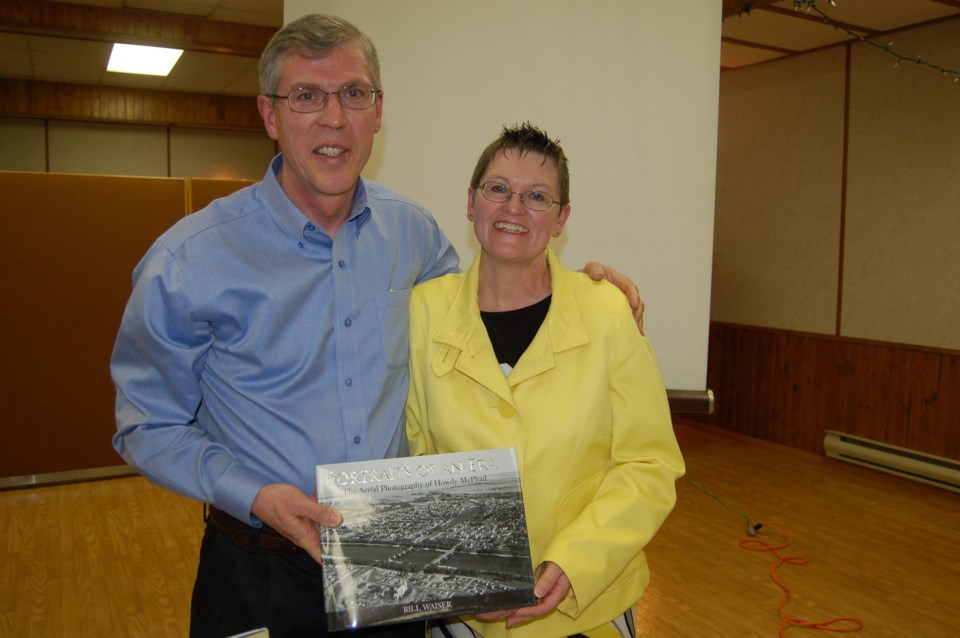Author and historian Bill Waiser took an audience on a trip through another time in Saskatchewan with a story about Howdy McPhail, a pilot and aerial photographer, who snapped more than 3,000 photographs of Saskatchewan farms and Canadian communities in the 1950s through to the 1980s.
Waiser was a special guest and presenter at the annual Estevan University Women's Club scholarship fundraising banquet in the Taylorton Room at Days Inn last Friday night.
About 75 people listened to Waiser while scanning photos taken by McPhail during the 25 minute power point presentation.
Waiser was one of three Saskatchewan authors who came to Estevan on Friday to celebrate books during the annual Book Festival Day at the Estevan Comprehensive School. He was joined by writers Leeann Minogue and Kelly Riess for readings and question and answer periods with students during the day and then Waiser joined the banquet crowd that evening for the second phase of the event.
The banquet also featured a silent auction of books donated to the University Women by Canadian publishing houses.
Mary Rose Boyer, president of the club, served as emcee for the evening's program which included the presentation of the 2010 scholarship to a female graduate of ECS who is intending to specialize in the maths or sciences. This year's winner was Eilish Burnard who is entered into the science program at the U of Regina with an intention of pursuing a degree in dentistry.
ECS educator/librarian Laurel Reimche introduced Waiser who was later thanked by Marguerite Gallaway.
Waiser, the author of 14 books, is a history professor at the University of Saskatchewan. His writings generally focus on Prairie stories and they have netted him a number of prizes and awards including the 2003 Saskatchewan Book Awards for non-fiction for his book on the On-To-Ottawa Trek and Regina Riot entitled All Hell Can't Stop Us.
Waiser was also a six-year host of a weekly CBC history feature that gathered honourable mention at the Columbus International Film and Video Festival.
His centennial piece on the province in 2006 got him the Clio Prize from the Canadian Historical Association.
But it was Howdy McPhail, another subject for a book on aerial photography and returning pilots who had just emerged from the Second World War, that caught the attention of the Estevan audience.
Howdy's Photo Album, he called it, featured McPhials photos and stories about the man who was born in Bankend, Saskatchewan and flew Lancaster bomber planes over enemy skies in the war.
McPhail earned a spot in the Saskatchewan Aviation Hall of Fame and his work was important because, as Waiser put it, "he knew the value of recording beyond the need of just making a sale."
McPhail's salesmen would tour the farms of Saskatchewan, selling the photos of their farm taken from the air for as little as $2.50 or just under $20 for a colour tinted, framed picture.
Sprinkling information about Saskatchewan during his narrative, Waiser pointed out that in 1952, when McPhail's business literally got off the ground, farming operations were still self sufficient enterprises. "Some of them had electricity, others didn't. Indoor plumbing came later. In fact there was a period in the '50s where there were more television sets in Saskatchewan than there were flush toilets," he told his audience.
This was a province where main streets ran perpendicular to the railway tracks and communities grew as small farm operations began to be abandoned.
McPhail, who mainly photographed farms in and around North Battleford, later went on to do aerial photography of towns and cities right across Canada, selling them to communities and calendar companies. In between those periods, during the peak farming seasons, he ran a robust crop spraying business.
"These guys who wanted to keep flying after the war, did just about anything they could think of just to stay in the air," said Waiser.
The historian noted how McPhail's photos were quite artistic compared with others, even though they were taken with a hand-held Kodak camera while he held the plane steady with his knees and flying at near stall speed at a particular angle to the ground.
"He took these photos to a level of art form," Waiser said.
Following the presentation, Waiser spent some time socializing and autographing copies of his books.




